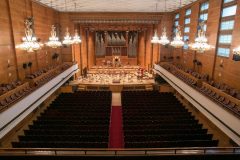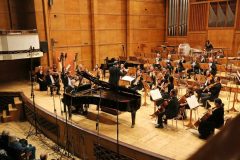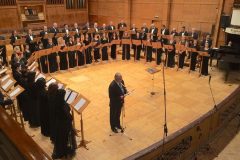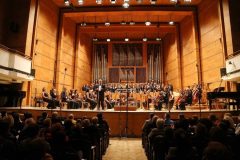The “Bulgaria” hall, situated in Sofia, has a rich history and plays a significant role in Bulgaria’s cultural scene. Here are some key points about its development:
1. Origins and Planning (1931): The idea for the hall came from the Official Cooperative Savings Insurance Company “Bulgaria,” which envisioned a complete complex, including a hotel. An architectural competition was held in 1931, and architects Stancho Belkovski and Ivan Danchov won the competition to design and implement the project.
2. Construction (1935-1937): Construction commenced in the spring of 1935, starting with the buildings on the side of “G. Benkovski” street, including the “Bulgaria” hall. The entire complex, adjacent to the Palace on “Tsar Osvoboditel” Blvd., was completed in the autumn of 1937.
3. Opening (October 9, 1937): The complex’s opening was celebrated with a concert featuring the Academic Symphony Orchestra, conducted by Tsanko Tsankov. Soloists included French organist Joseph Bonnet and pianists Dimitar Nenov and Luba Encheva.
4. Original Structure: The “Bulgaria” hall initially had a large seating capacity of 1,470, including the ground floor, two balconies, and boxes. The stage was designed for a 100-person orchestra and a 200-member choir. The hall featured a Sauer organ from Frankfurt am Oder.
5. Destruction and Restoration (1944-1949): The hall suffered damage during the bombing on May 24, 1944, resulting in the destruction of the hall, the organ, and two grand pianos. Reconstruction efforts took place, and by 1949, the hall was restored, hosting performances by the Royal Military Symphony Orchestra.
6. Contemporary Role: Today, the “Bulgaria” hall serves as a prominent center for stage performances by both Bulgarian and international artists and musical ensembles. It hosts a variety of events, including concerts, competitions, sound recordings, reviews, festivals, lectures, and more.
7. Renovation (2010/2011): At the end of the 2010/2011 season, a significant renovation project was undertaken for the “Bulgaria” concert complex. The renovation was funded under the “Operational Regional Development Program 2007 – 2013,” with the Ministry of Culture as the beneficiary.
The “Bulgaria” hall continues to be a vital cultural institution, contributing to Bulgaria’s musical and artistic heritage.





